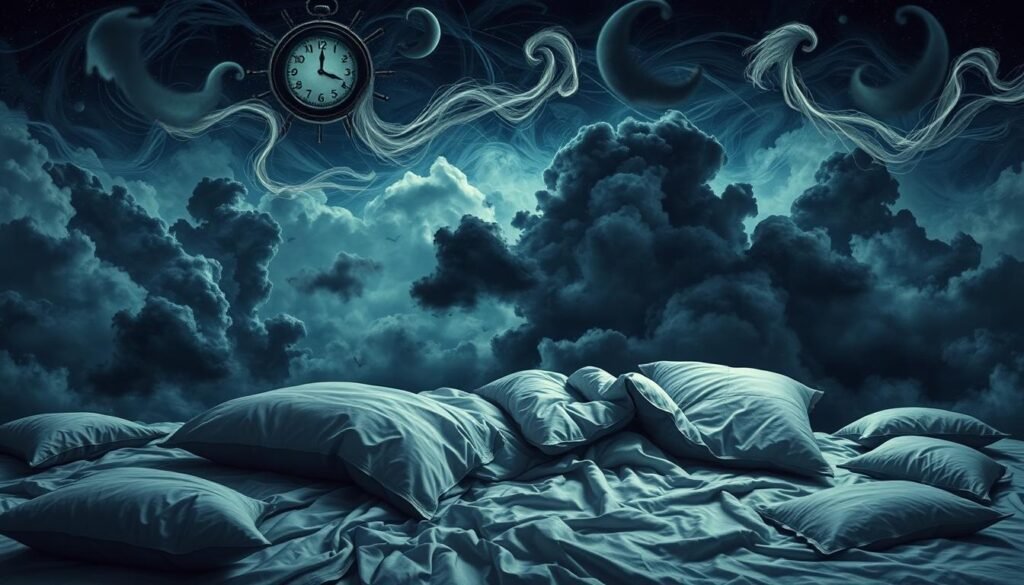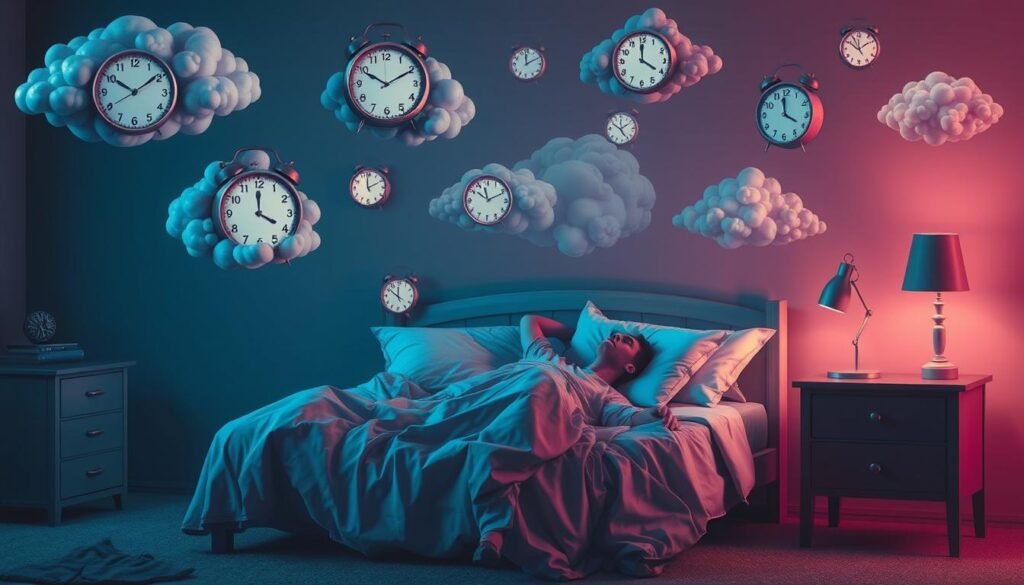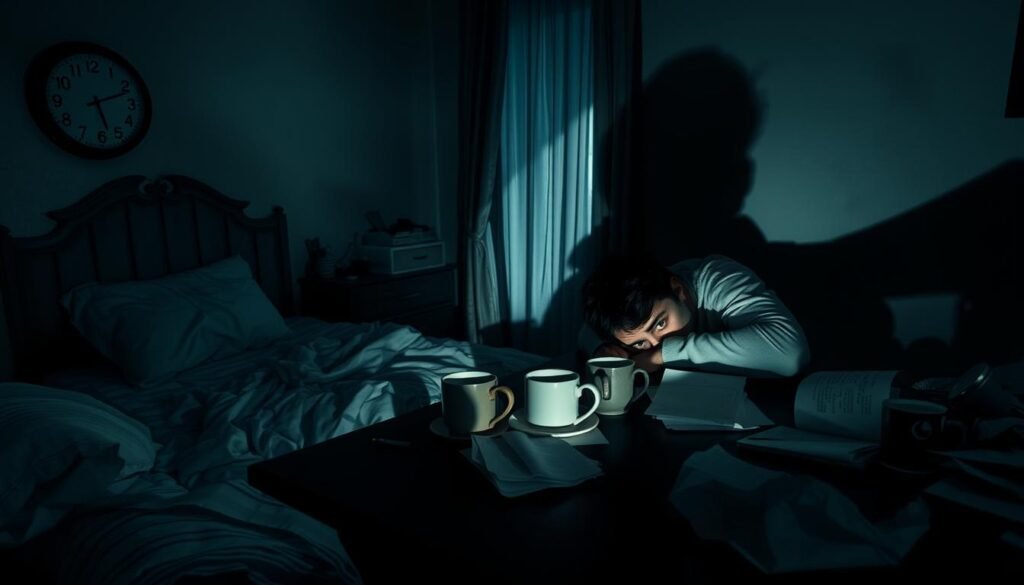Did you know about 20% of U.S. adults get less than five hours of sleep a night? They miss the recommended seven hours.
This lack of sleep can cause car crashes, work mistakes, heart issues, and even early death. With many struggling with sleepless nights, it’s vital to know about sleep deprivation.
Sleep deprivation means not getting enough rest. It can be a short-term issue or a long-term problem. It stops the body and mind from recovering properly.
In the U.S., it’s believed that 50 to 70 million adults face sleep deprivation. This article will explore the effects of insomnia, understand sleep disorders, and suggest how to treat and prevent them.
Key Takeaways
- Sleep deprivation affects a significant portion of the U.S. population.
- Insomnia is distinct from sleep insufficiency, impacting sleep patterns differently.
- Insufficient sleep can lead to a range of mental and physical health issues.
- Chronic sleep deprivation can contribute to serious health conditions.
- Adequate sleep is essential for optimal functionality and well-being.
What is Sleep Deprivation?
Many people don’t get enough sleep. This lack of sleep affects your body and mind. Knowing about sleep deprivation helps improve sleep and health.
Definition and Overview
Sleep deprivation means not getting enough rest. It can show up as insomnia or not taking the chance to sleep. The Centers for Disease Control and Prevention say about 1 in 3 U.S. adults don’t sleep enough. Adults should sleep 7 to 9 hours a night.
Types of Sleep Deprivation
There are two main types of sleep deprivation: chronic and acute. Chronic is not sleeping enough regularly, affecting daily life. Acute happens now and then but still impacts you. Not sleeping enough can cause mood changes, memory problems, and even serious health issues. Studies show not sleeping enough can lead to diseases like heart problems and diabetes.
| Type of Sleep Deprivation | Description | Examples |
|---|---|---|
| Chronic Sleep Deprivation | Consistently failing to meet sleep needs over an extended period. | Daily lack of sleep due to lifestyle choices or obligations. |
| Acute Sleep Deprivation | Short-term sleep loss due to specific events or stresses. | One or two missed nights of sleep during a busy week. |
Stress, anxiety, and lifestyle choices can cause poor sleep. Improving sleep hygiene practices helps sleep better. Paying attention to and tackling sleep issues enhances life and health.
Insomnia Hours and Their Impact
Insomnia affects our daily lives deeply, touching upon how we perform and feel, both emotionally and physically. Around 20-40% of adults struggle with sleep problems, and 17% see it as a major concern. This shows how widespread sleep issues are and their power to upset many areas of our lives.
How Insomnia Hours Affect Daily Life
People with insomnia face many daily challenges. A lack of restful sleep can lead to:
- Decreased alertness and concentration.
- Slower reaction times which can be detrimental in work or driving situations.
- Impaired cognitive functions that affect decision-making abilities and creativity.
This lack of sleep starts a cycle of bad sleep quality, which brings mood swings and crankiness. Those who face insomnia for three months or more struggle even more in their day-to-day tasks. Even if someone usually sleeps 7 to 9 hours, their productivity might drop to 60-70% with only 4.5 to 5.5 hours of sleep.
As people get older, sleep problems become more common. Folks over 60 are at higher risk for insomnia due to changes in sleep patterns, stress, and health issues. It’s critical to recognize how insomnia affects us to look for solutions or make lifestyle changes. This might mean setting a steady sleep schedule or trying relaxation methods to improve sleep quality.

Understanding Sleep Disorders
Sleep disorders can mess up how well we sleep and impact our health. Many people don’t get enough sleep because of different reasons. Knowing about sleep problems is key to sleeping better and staying healthy.
Common Sleep Disorders Associated with Sleep Deprivation
Many Americans struggle with sleep disorders due to lack of sleep. Here are some common ones:
- Insomnia – Hard time falling or staying asleep. Around one-third of adults have it, with 4-22% having serious insomnia.
- Obstructive Sleep Apnea – This stops or slows breathing when sleeping. It can happen to anyone, no matter their age or size.
- Restless Legs Syndrome – Caused by things like lacking vitamins or certain medicines. It makes your legs feel weird and affects sleep.
- Narcolepsy – It leads to feeling super tired during the day and can mess up sleep schedules.
Insomnia vs. Sleep Insufficiency
It’s important to know the difference between insomnia and not sleeping enough. Insomnia means you can’t sleep well on a regular basis. Not sleeping enough is when you have the chance but don’t get enough sleep. Stress and lifestyle choices like drinking coffee or alcohol can make insomnia worse. Knowing this can help us take better care of our sleep and get help if we need it.

| Sleep Disorder | Symptoms | Potential Causes |
|---|---|---|
| Insomnia | Difficulty falling/staying asleep, daytime fatigue | Stress, anxiety, lifestyle choices |
| Obstructive Sleep Apnea | Snoring, gasping for air at night, morning headaches | Obesity, age, structural abnormalities |
| Restless Legs Syndrome | Creeping sensations, urge to move legs, sleep disruption | Nutrient deficiencies, medications |
| Narcolepsy | Excessive daytime sleepiness, sudden sleep attacks | Genetics, environmental factors |
Symptoms of Sleep Deprivation
The symptoms of sleep deprivation affect how we function every day and our health. Common problems include less alertness, worse memory, and mood swings. People often feel anxious and less emotionally stable. This can hurt mental health. It’s important to notice these signs. Doing so can lead to changes that improve sleep.
Mental and Cognitive Effects
Sleep deprivation leads to various mental issues. These are:
- Impaired decision-making abilities.
- Diminished creativity.
- Reduced ability to concentrate.
- Increased likelihood of forgetfulness.
Sleep deeply influences how our mind works. Studies show that going 24 hours without sleep lowers brain function. It’s like having a blood alcohol content (BAC) of 0.10 percent. Many adults also nod off during the day because their brain isn’t working well.
Physical Health Consequences
Poor sleep badly affects our bodies. It’s linked to serious issues like heart disease, high blood pressure, and diabetes. The dangers include:
- Weakened immune response.
- Increased susceptibility to infections.
- Higher likelihood of accidents, including car crashes.
- Enhanced risk of falls in older adults.
About 35 percent of U.S. adults don’t get enough sleep, says the Centers for Disease Control and Prevention. Tips for better sleep can help improve sleep quality. You can learn more about the effects of sleep deprivation online.

Sleep deprivation impacts both our minds and bodies greatly. Knowing about it and taking action is key for our health.
How Sleep Deprivation Happens
We can learn a lot by figuring out how sleep deprivation occurs. It can come about through various factors. Many of these are linked to our everyday life choices and habits. Knowing what causes it is the first step to solving sleep problems.
Common Causes of Insomnia Hours
Many everyday things can cause sleep deprivation. Some key ones include:
- Irregular sleep schedules: Changing sleep times often upsets our body’s clock.
- Screen exposure: Using electronic devices at night can keep us awake due to the blue light they emit.
- Stimulant consumption: Drinking caffeine or smoking can make it hard to sleep.
- Stressful life events: Worry and stress can ruin a good night’s sleep.
- Health issues: Being sick or in pain can prevent us from sleeping well.
Role of Lifestyle and Habits
Our daily habits and lifestyle have a big impact on how well we sleep. It’s important to have a routine to fight off insomnia. Some tips are:
- Keep the same sleep and wake times to get your body’s clock on track.
- Make sure your bedroom is quiet and comfortable.
- Do calm activities before bed, like reading or meditating.
- Stop using screens at least an hour before bedtime to help your mind relax.
- Watch what you eat and drink before going to sleep.
Circadian Rhythm Disturbances and Sleeplessness
Circadian rhythm disturbances are a big cause of sleeplessness. Many people with insomnia suffer from this. Our internal clock, which follows a 24-hour cycle, controls our sleep. When this gets disrupted by things like shift work or travel, sleep quality drops. This also makes it hard to keep a regular sleep schedule.
Research shows that issues like Delayed Sleep-Wake Phase Disorder (DSWPD) and Shift Work Sleep Disorder are common. DSWPD mostly affects teens and young adults. It impacts about 4.6% of them. On the other hand, Shift Work Sleep Disorder is seen in a third of those who work shifts. Common symptoms include trouble falling asleep, feeling overly sleepy during the day, and not being happy with sleep quality.
To better our sleep, it helps to understand how circadian rhythms work. Aligning our daily activities with our body’s natural cycle can improve sleep. Things like getting enough light during the day, sticking to a steady sleep schedule, and maybe using melatonin supplements can help adjust our rhythms. If sleeplessness is a big problem, it’s wise to see a healthcare provider. They can offer ways to treat it effectively. To find out more, check out the hidden dangers of untreated insomnia.
Treatment and Prevention Strategies
To fight sleep deprivation, we need a plan that includes treatment and prevention. Making a sleep-friendly place is key. It means having a bedroom that helps you sleep well. You should have it dark, cool, and quiet. Also, creating a calming routine before bed will help a lot. This can make your sleep much better and more refreshing.
Creating a Sleep-Friendly Environment
How to make a sleep-friendly space:
- Reducing light exposure and using blackout curtains.
- Keeping room temperature between 60-67°F.
- Minimizing noise with sound machines or earplugs.
- Creating a calming bedtime routine with activities such as reading or meditation.
- Investing in a comfortable mattress and pillows.
All these steps can improve your sleep hygiene. Good sleep hygiene is essential for preventing sleep problems.
Professional Treatment Options
Sometimes, sleep issues need more help. Cognitive behavioral therapy for insomnia, or CBT-I, is very effective. It works by changing negative thoughts and habits that hurt your sleep. CBT-I can also include lifestyle and routine changes. Plus, relaxation methods to get better sleep. You can learn more about effective treatments online.
In some situations, doctors may suggest medication for a short time. There are many sleep aids, including ones for falling and staying asleep. But, it’s important to think about their side effects and the risk of dependence. Working closely with a doctor will help you find the best plan for your needs.
Long-term Effects of Insufficient Sleep Duration
Not getting enough sleep for a long time affects our minds and bodies deeply. Studies show not sleeping five to six hours leads to big problems. Knowing these effects is key to stay healthy.
Impact on Mental and Physical Health
Sleeping too little brings big health issues. It raises the chance of depression and anxiety. Not resting enough also makes people eat more unhealthy foods.
Not sleeping enough can harm how our body uses sugar. This may increase the risk of type 2 diabetes. It’s linked to high blood pressure and heart issues too. Less sleep can make you gain weight and get sick more often.
Increased Risk of Chronic Conditions
Skipping enough sleep can lead to ongoing health problems. It’s tied to not doing well in daily tasks. Nearly 70 million in the U.S. face sleep disorders that affect their life.
Poor sleep can cause problems having children. It might also lead to mental health issues, like feeling lost or paranoid.
Conclusion
Insomnia and sleep loss greatly affect our daily lives and health over time. Studies show that about 26.4% of college students struggle with insomnia. This issue does more than just make you tired; it can cause poor grades, slow academic progress, and increase the risk of mental health problems. Mental health challenges can include depression and ADHD.
It’s vital to understand the importance of getting enough sleep. An expert panel reviewed over 2,400 articles to recommend how much sleep we need. Their research shows that not sleeping enough can hurt our grades. For more insights, they suggest we all should focus on sleeping better to avoid these issues. If you’re interested in learning more about how sleep affects grades, check out this study.
Improving our sleep can lead to better health and school performance. It’s not just about feeling more rested. Good sleep is key to a healthy lifestyle. By understanding our sleep habits and insomnia’s effects, we can make choices that improve our health and success.